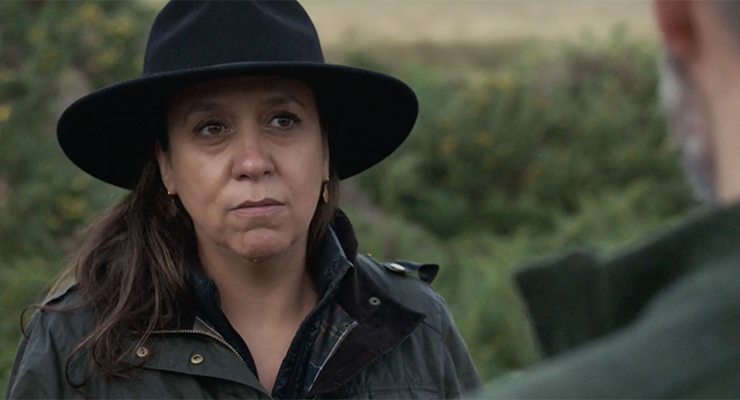
Filmmaker and Arrernte/Kalkadoon woman Rachel Perkins, the creative force behind The Australian Wars, the groundbreaking series looking at the bloody history of European settlement, hopes the program will help Australians understand why First Nations peoples believe a Voice to Parliament is important.
Perkins spoke to Crikey on the eve of the airing of the final episode of the three-part series on SBS Demand. She hoped the series would help Australians better understand why First Nations peoples had the aspirations outlined in the Uluru Statement from the Heart.
“I hope that this documentary series, by bringing the past to the front of mind of some of the nation — at least those who view it — that they will understand more clearly those aspirations,” Perkins said. “And they will be able to walk in our shoes and see history from our point of view.”
The Uluru Statement from the Heart proposes an Indigenous Voice to Parliament recognised in the Australian constitution, a Makarrata Commission to oversee agreement-making between First Nations peoples and various levels of government, truth-telling about the history of the country, and a declaration of recognition.
A referendum on including a Voice to Parliament is set to be held at some stage during this electoral cycle. Perkins said she aimed for the three-hour series to help build awareness of why the various elements of the Uluru Statement are required, and why First Nations peoples want them.
Perkins’ documentary also gives a voice to people who have spent their lives studying the history of First Nations peoples. She spoke to a range of historians, including the co-chair of the Indigenous Voice Co-design Process, Professor Marcia Langton, for the documentary series.
Perkins said it wasn’t that hard to get the historians involved because each one appearing on the show had spent decades studying this part of history and was keen to share what they had learned about the conflicts between the First Nations peoples and the settlers.
“It didn’t take long to round them up. This is their life’s work. You know, they want the opportunity to talk about it to a wide Australian audience, because very few Australians are willing to pick up a history book and read it — especially on this topic,” Perkins said.
“They saw that this series would allow them to speak, and bring their work and what they have discovered, which they feel very passionately about, to a broader audience.”
Series such as The Australian Wars have a long shelf life and become an educational resource for schools and universities. The not-for-profit organisation Culture is Life has developed educational materials for teachers in secondary schools to help with the history set out in the documentary.
“They cover Years 9, 10, 11, and 12, and it is my hope that we can also in the future design materials to support the university sector,” Perkins said.








“The Australian Wars” How so? Why not “Indigenous Wars”? Or more accurately “Clash of Cultures 1770 – 2022”? The latter of the three certainly most accountable.
And accountability more so, than educational or historical. Really, the nub of what presents to be both central and intentional in fact, verges upon presentational devise. If not for emotional impact and future aspirations. Sad for ‘all’ Australians.
I think I’d probably disagree. If I could work out what you’re trying to say.
Ye gods man. This is the ‘Jackson Pollack painting’ of paragraphs
Thanks, Tom!
“Perkins said, ‘It didn’t take long to round them up'” – the historians involved in the documentary. “This is their life’s work … They want the opportunity to talk about it to a wide Australian audience because very few Australians are willing to pick up a history book and read it – especially on this topic”.
And from today’s Pearls and Irritations:
“Celebrated film maker Rachel Perkins declared that the Memorial’s (War Memorial) change of heart (29/09/22) was a ‘watershed moment’. More intriguing then because the announcement was made the day after the showing on SBS of the second episode of her groundbreaking series, The Australian Wars.”
See the below link for context in relation to the last quoted sentence.
https://johnmenadue.com/frontier-wars-at-the-war-memorial/
Well said Rachel.
This article reads more like a PR handout than a critical report.
Why would it be a critical report. The series is much needed and a powerful resource. Have you watched it? What did you learn from it?